中考英语--易混代词的区分.
中考英语易混易错代词考点剖析

d rt r e e he te ?
句 中 的 名 词 性 物 主 代 词 mn ie不 能 写 成 法 。例 如 :
Da ili lt a d e p u . He s g o n e s poie n h l f 1 i a o d
Y s hs i Ma Ln p a ig 是 的 ,. m , 为 mie与 o 短 语 连 用 是 一 种 习惯 表 达 e.T i s i sekn . y因 n f
E g s n ht eykn f i nl ha dta S r ido m.王 兵 经 常帮 i ’v h 我学英 语 。他 真好 。 句 中的指示 代 词 ta 不 能 写成 ti。 因为 ht hs “ 他真 好 ” 原 因 是 “ 兵 经 常 帮 我 学 英 语 ” 的 王 。 ta 指上 文提 到 的事 情 。如 果 要 表示 近处 或 下 ht
我是 。
这是 打 电话 用 语 。 询 问 对 方 是 谁 时 , 能 不
说 Aeyu r o …?应 该 说 I ta… sekn?应 答 sht paig
时不能 说 I m… 应该 说 T i i… sekn .或 a hs s p a ig
S a i g pe k n . ● Th i n o r ct s n ta r s s t a e ari u i i o sfe h a h t y
考点专题
中考 英 语 易 混 易 错 代 词 考 点 剖 析
初中中考英语复习资料-代词全面解析

初中英语复习资料_代词解析代词的分类:人称代词、物主代词、反身代词、指示代词、关系代词、疑问代词、连接代词和不定代词等。
(1)、主格用来作句子的主语、表语。
I often go shopping on Sundays.(星期天我常去购物)Are they from Brazil?(他们是巴西人吗?)Where have they gone?(他们上哪儿去了?)It’s he!(是他!)(2)、宾格用来作及物动词或者介词的宾语。
Who teaches you English this year?(今年谁教你们的英语?)Help me!(救救我!)We often write letters to her.(我们常给他写信)(3)、人称代词作表语或者放在比较状语从句连词than或as之后时,可以用主格形式,也可以用宾格形式,口语中大多用宾格。
–It’s I/me.(是我。
)(4)、三个不同人称同时出现,或者主语中包含“我”时,按照“you→he→I”的顺序表达。
Both he and I are working at that computer company.(我和他都在那家电脑公司上班)–Who will go there?(谁要去那儿?)–You and me.(你和我)(5)、人称代词it除了可以指人指物之外,还可以表示“时间、天气、温度、距离、情况”等含义,此外还可以作“非人称代词”使用,替代作主语或者宾语的不定式、动名词或者名词性从句。
--What’s the time?(几点啦?)–It’s 12:00.(12点)It’s a long way to go.(那可要走好长的路)It took him three days to clean his house..(打扫屋子花了他三天的时间)It is very clear that the public want to know when these men can go into space(很显然,公众想知道这些人什么时候能进入太空)(1)、形容词性物主代词只能作句子中名词的修饰语,后面要跟名词。
2024中考备考英语重难点01 易混名词辨析(解析版)
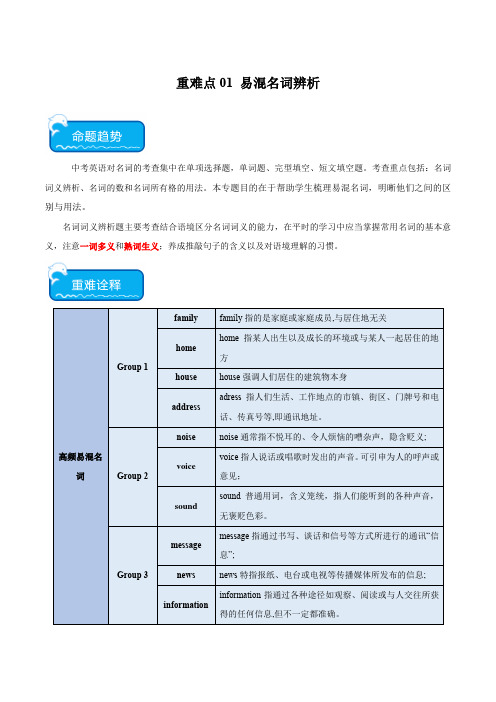
重难点01 易混名词辨析中考英语对名词的考查集中在单项选择题,单词题、完型填空、短文填空题。
考查重点包括:名词词义辨析、名词的数和名词所有格的用法。
本专题目的在于帮助学生梳理易混名词,明晰他们之间的区别与用法。
名词词义辨析题主要考查结合语境区分名词词义的能力,在平时的学习中应当掌握常用名词的基本意义,注意一词多义和熟词生义;养成推敲句子的含义以及对语境理解的习惯。
(2023中考真题建议用时:15分钟)1.(2023·辽宁鞍山·中考真题)—Why does Mary get good grades each time?—I think that’s because she puts most of her ________ into her schoolwork.A.energy B.practice C.exercise D.process2.(2023·内蒙古·中考真题)—The model plane is wonderful! How did you make it?—It’s easy. Follow the ________ and you can do it, too.A.discussion B.education C.conditions D.instructions3.(2023·江苏淮安·中考真题)As a student, you should keep a ________ between your schoolwork and yourhobbies.A.diary B.record C.secret D.balance4.(2023·湖北襄阳·中考真题)—Mr. Fan runs at least half an hour every day.—What a good ________! No wonder he looks healthy.A.habit B.question C.article D.prediction5.(2023·湖北黄石·中考真题)—Could you tell me the ________ of making such tasty dumplings?—Well, I just follow the steps on Tiktok.A.cost B.method C.time D.menu6.(2023·内蒙古呼和浩特·中考真题)High-speed trains are seen as one of the new Four Great ________ of China.A.Inventions B.Advantages C.Environments D.Technologies7.(2023·江苏常州·中考真题)After she was brought back to China, the sick giant panda Ya Ya received good ________ in her new home and got better.A.education B.communication C.entertainment D.treatment8.(2023·江苏南通·中考真题)—________ are easily made, but not easily kept.—That’s true. Once you make one, be sure to keep it.A.Speeches B.Decisions C.Promises D.Suggestions9.(2023·江苏镇江·中考真题)The main ________ of the cities along the Grand Canal (大运河) is history and culture.A.attraction B.pollution C.invention D.situation10.(2023·青海·中考真题)A taxi driver prevented (阻止) an _________ when he saw a car with serious problems travelling across Huangnan.A.accident B.interview C.advertisement11.(2023·山东青岛·中考真题)Before flying a plane, a ________ must take a lot of training.A.policeman B.musician C.nurse D.pilot12.(2023·湖北十堰·中考真题)—How did you fix up the machine, dad?—It’s easy. I just followed the ________.A.instructions B.inventions C.interviews D.influences13.(2023·江苏徐州·中考真题)Of all the ________, I love summer best.A.seasons B.subjects C.colours D.hobbies14.(2023·辽宁丹东·中考真题)Mary’s parents are interested in ________, so they often take her to concerts.A.sports B.music C.science D.movies15.(2023·江苏宿迁·中考真题)—The girl’s beautiful pronunciation caught our ________ in yesterday’s English speech competition.—Yes, many students couldn’t help cheering for her.A.condition B.attention C.invention D.position16.(2023·江苏泰州·中考真题)—Good news! The Chinese women table tennis team won a gold and a silver again.—Great! No matter who wins the medals, it is the ________ of our country.A.price B.pioneer C.pride D.pain17.(2023·黑龙江牡丹江·中考真题)Although our school life is a little busy, it is full of ________.A.pain B.sadness C.laughter18.(2023·四川遂宁·中考真题)—Which movie would you like to watch, Tracy?— Um…it’s hard to make a ________.A.survey B.choice C.call D.wish19.(2023·辽宁·中考真题)Thanks to the teacher’s help, I solved all the ________ easily.A.chances B.problems C.habits D.grades20.(2023·辽宁营口·中考真题)Scientists who are full of ________ always come up with new ideas and bring great changes to our life.A.instruction B.instrument C.invention D.introduction1.A【详解】句意:——为什么玛丽每次都取得好成绩?——我想那是因为她把大部分精力都放在功课上了。
中考英语 代词核心必考点

中考冲刺经典专题系列第二讲中考必考点----代词必考点之易错易混部分:考点一:人称代词:主格;宾格。
考点二:物主代词:形容词性物主代词和名词性物主代词。
考点三:反身代词:掌握短语:enjoy oneself, learn---- by / teach oneself, help oneself to sth, makeoneself at home, dress oneself考点四:指示代词:this,that,these,those。
This,that特别用于打电话指自己和对方。
考点五:疑问代词:what,which,who,whom考点六:不定代词:A:some & any。
B:few / a few & little / a littleC:each & every:each (常与of连用) 做主谓用单,强调个体;every(形容词)+单数名词作主谓语用单,强调整体D:both,either,neither,all,noneE:other,others,the other,the others,anotherF:复合不定代词:something,anything,everything,nothing等等。
考点七:it,that,one的区别。
1. — Who broke the window? — Not _____.A. IB. heC. her2. Miss Li invited __ have dinner with her .A. me and youB. you and IC. you and me3.We ____ at the party last Sunday.A. enjoyed myselfB. enjoyed ourselvesC. enjoy myselfD. enjoyed themselves4. Only____know it.A. I and heB. he and youC. he and ID. I and you5. "Make____at home." he said to his friends.A. yourselfB. yourselvesC. youD. yours6. The population of Shanghai is larger than __ of Jinan.A. thatB. thisC. it7. The radios made in Beijing are as good as ___ made in Qingdao.A. thatB. theseC. those8. ----____ is your classmate John like? ---He's very tall.A. HowB. WhatC. Who D . Which9. Do you have _____ to do this evening?A. important somethingB. anything importantC. something important10. Would you like __? I can get it for you .A. something elseB. anything elseC. everything else11. Although all the girls have tried their best , only ___ pass the exam.A. fewB. a fewC. a little12. Don’t worry .There is ____ time left .A. littleB. a littleC. few13. You are so great! ____ people in the school can do it .A. A littleB. LittleC. Few14. Each of them __ an apple.A. haveB. hasC. having15.There is a line of trees on ___ side of the street.A everyB eachC both16. How many people are there in the room? — ___.A. NoneB. No oneC. Lucy17. Who is in the room? — ___.A. NoneB. No oneC. one18. ___ of the girls ___ him. They asked him for name card.A. Neither; knowB. Either; knowC. Neither; knows19. Both of his parents ___ teachers.A. isB. areC. was20. How are your parents ? They are ____ fine.A. bothB. allC. no21. There are 40 students in our class, 22 are boys ,__ are girls.A. the othersB. othersC. the other22. One of the sides of the road should be painted yellow, and___ white.A. the other B.another C. others23. This pair of trousers is too short. Would you please show me ___ one.A. otherB. othersC. another24. I have two brothers. __ is a doctor, __ is a soldier.A. One, the otherB. One, otherC.The one, the otherD. One; the others25. Some people like to stay at home on Sundays, but ____ like to go to the cinema.A.otherB. anotherC. the othersD. others26. I have five color pencils, one is red, another is blue and ______ are green.A.the othersB. otherC. the otherD. others27. I found ____ important to read English in the morning.A. itB. thatC. whichD. its28. I have some apples here. You can have____.A. oneB. itC. thatD. those29. The population of China is much larger than ____ of Canada.A. itB. thatC. oneD. this30. Which would you like, a cup of tea or a glass of milk? -____, thanks. I think I'll just have a glass of water.A. NoneB. NeitherC. BothD. Either31. There are many trees on ____side of the street.A. eitherB. bothC. allD. every一完形填空【2011浙江湖州】Alicia was a young woman who liked to exercise for her health. In fact, she walked five kilometers before 26 every morning, and went swimming once a week at the swimming pool. She didn’t smoke and never 27 . She didn’t eat chocolate. She didn’t e at sweet and fatty food, 28 . She weighted herself every day.One day Alicia was on her daily walk when she saw a 29 sitting in a rocking chair under a tree. He looked very old and his hair was white. He looked thin and weak, and his hands were shaking, 30 he looked very happy.He smiled at her and said, “Good morning! Lovely day, isn’t it?”He had a wide smile 31 his face, and his eyes shone with happiness. But Alicia saw that he did not have teeth.“Good morning!” replied Alicia. “Yes, it is a lovely day.”Alicia thought he 32 very old and wise. She thought he must be at least 90 years old! She decided to ask him about the 33 of a happy old age.“I hope you don’t 34 me asking,” she said, “but what is your secret for bei ng so happy at your age? I hope I can look as happy as you do 35 I am your age.”The man in the rocking chair said, “My secret for 36 ? I smoke twenty packets of cigarettes every week, and drink three bottles of wine every day. I eat hamburgers and chocolates whenever I want. I never eat vegetables. I never walk anywhere and I never play sports. I sit at home every day.”Alicia was 37 . She didn’t expect the man to give her an answer like that. She wondered how the man got to be so old when he did 38 wrong. She thought he should be 39 and unhappy. Perhaps she was wrong. Maybe, she thought, people could live a long happy life 40 eating well or doing lots of exercise.“How old are you?” she asked.“It’s my birthday today,” said the man. “I’m forty -seven!”26. A. lunch B. breakfast C. dinner D. supper27. A. exercised B . drank C. worked D. slept28. A. too B. also C. either D. still29. A. man B. woman C. boy D. girl30. A. so B. but C . and D. or31. A. in B. with C. at D. on32. A. saw B. looked C. listened D. found33. A. secret B. dream C. plan D. future34. A. stand B. mind C. allowD. enjoy35. A. when B. since C. though D. for36. A. health B. success C. happiness D. life37. A. surprised B. worried C. excited D. relaxed38. A. something B. anything C. everything D. nothing39. A. angry B. serious C. quiet D. sick40. A. through B. from C. without D. byBNasreddin was a poor man, so he tried to grow __1__ he could in his own garden, so that he would not have to buy so many in the market。
中考总复习资料 英语易混淆词记忆大全
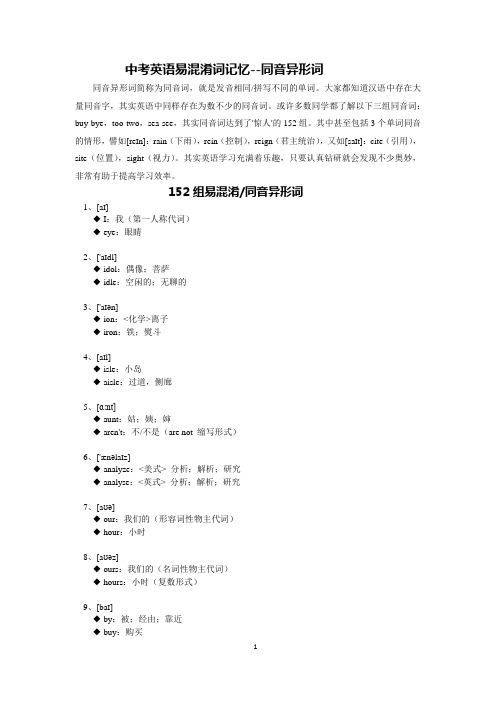
中考英语易混淆词记忆--同音异形词同音异形词简称为同音词,就是发音相同/拼写不同的单词。
大家都知道汉语中存在大量同音字,其实英语中同样存在为数不少的同音词。
或许多数同学都了解以下三组同音词:buy-bye,too-two,sea-see,其实同音词达到了'惊人'的152组。
其中甚至包括3个单词同音的情形,譬如[reɪn]:rain(下雨),rein(控制),reign(君主统治),又如[saɪt]:cite(引用),site(位置),sight(视力)。
其实英语学习充满着乐趣,只要认真钻研就会发现不少奥妙,非常有助于提高学习效率。
152组易混淆/同音异形词1、[aɪ]◆ I:我(第一人称代词)◆ eye:眼睛2、['aɪdl]◆ idol:偶像;菩萨◆ idle:空闲的;无聊的3、['aɪən]◆ ion:<化学>离子◆ iron:铁;熨斗4、[aɪl]◆ isle:小岛◆ aisle:过道,侧廊5、[ɑːnt]◆ aunt:姑;姨;婶◆ aren't:不/不是(are not 缩写形式)6、['ænəlaɪz]◆ analyze:<美式> 分析;解析;研究◆ analyse:<英式> 分析;解析;研究7、[aʊə]◆ our:我们的(形容词性物主代词)◆ hour:小时8、[aʊəz]◆ ours:我们的(名词性物主代词)◆ hours:小时(复数形式)9、[baɪ]◆ by:被;经由;靠近◆ buy:购买◆ bye:再见10、[baʊ]◆ bow:鞠躬;弓◆ bough:大树枝11、[bænd]◆ band:带,乐队◆ banned:被禁止的;禁止(ban的过去分词)12、['bær(ə)n]◆ baron:男爵;大亨,巨头◆ barren:贫瘠的;不孕的13、[beə]◆ bare:裸露的◆ bear:熊;忍受14、[bɜːθ]◆ berth:卧铺;停泊◆ birth:出生;血统;起源15、[biː]◆ be:是◆ bee:蜜蜂16、[biːn]◆ bean:豆◆ been:是;有(be的过去分词)17、[bluː]◆ blue:蓝色的;忧郁的◆ blew:吹;打击(blow的过去式)18、[bred]◆ bread:面包;食物◆ bred:生育,繁殖(breed的过去式和过去分词)19、[breɪk]◆ brake:刹车;阻碍◆ break:打破;间断20、[briːtʃ]◆ breach:违反◆ breech:后膛;臀部21、[dæm]◆ dam:水坝,障碍物◆ damn:诅咒,指责22、[daɪ]◆ die:死亡;枯竭◆ dye:染色23、['daɪəlɒg]◆ dialog:<美式> 对话;对白◆ dialogue:<英式> 对话;对白24、['daɪɪŋ]◆ dying:垂死的,临终的;死亡(die的现在分词)◆ dyeing:染色;给…上色(dye的现在分词)25、[dɪə]◆ deer:鹿,梅花鹿◆ dear:亲爱的;可爱的人;昂贵的26、[dɪ'fens]◆ defense:<美式> 防卫,防守;辩护◆ defence:<英式> 防卫,防守;辩护27、[dɪ'skriːt]◆ discreet:谨慎的,考虑周到的◆ discrete:分离的,不相关联的28、[djuː]◆ dew:水珠,露水◆ due:适当的;应有的;由于29、[eɪt]◆ ate:吃(eat的过去式)◆ eight:[数]八30、[ə'sent]◆ ascent:上升◆ assent:同意,赞成31、['fɑːðə]◆ father:父亲◆ farther:更远的(far的形容词比较级)32、['faɪbə]◆ fiber:<美式> 光纤;纤维;纤维制品◆ fibre:< 英式> 光纤;纤维;纤维制品33、[faʊl]◆ foul:犯规;犯规的;邪恶的◆ fowl:家禽;禽肉34、['feɪvərɪt]◆ favorite:<美式> 喜爱的;最喜爱的人或物◆ favourite:<英式> 喜爱的;最喜爱的人或物35、[fɜː]◆ fir:冷杉;枞木◆ fur:皮毛,皮衣36、[flɔː]◆ flaw:瑕疵,缺点;裂缝◆ floor:地面,地板;楼层37、[fɔ:]◆ for:为了…;因为…;给…◆ four:[数]四38、[fɔːθ]◆ forth:向前;向外◆ fourth:[数]第四39、[feə]◆ fair:公平合理的◆ fare:车费;路费;乘客40、[feɪnt]◆ faint:晕倒;模糊的◆ feint:佯攻,假装41、['flaʊə]◆ flour:面粉◆ flower:鲜花42、[fluː]◆ flu:流感◆ flew:飞(fly的过去式)43、[gest]◆ guest:客人◆ guessed:猜测(guess的过去式)44、[gə'rɪlə]◆ gorilla:大猩猩;暴徒◆ guerrilla:游击队员45、[gɪlt]◆ gilt:镀金的◆ guilt:犯罪;过失46、[grəʊn]◆ groan:呻吟;抱怨◆ grown:长大的,成年的;生长(grow的过去分词)47、[griːn]◆ Green:格林◆ green:绿色的48、[griːs]◆ Greece:希腊◆ grease:油脂,贿赂49、[haɪ]◆ hi:嗨;喂◆ high:高的50、[hɑːt]◆ hart:雄赤鹿◆ heart:心脏51、['herəʊɪn]◆ heroin:海洛因◆ heroine:女英雄;女主角52、[həʊl]◆ whole:整个的◆ hole:孔,洞,坑53、[heə]◆ hair:头发◆ hare:野兔54、[hɜːd]◆ herd:牧群◆ heard:听见(hear的过去式和过去分词)55、[hiːl]◆ heal:治愈◆ heel:脚跟56、[hɪə]◆ hear:听见◆ here:这里57、[hɔːl]◆ hall:走廊;大厅◆ haul:拖,拉58、[huːz]◆ whose:谁的◆ who's:是谁(who is 缩写形式)59、[ɪn]◆ in:在...里面;处于...状态;以...方式◆ inn:小旅馆;小饭店60、[ɪn'flekʃən]◆ inflection:<美式> 弯曲;变调◆ inflexion:<英式> 弯曲;变调61、[jəʊk]◆ yolk:蛋黄◆ yoke:束缚;纽带62、['kænən]◆ canon:标准,教规◆ cannon:大炮63、['kʌlə]◆ color:<美式> 颜色;颜料;把…涂颜色◆ colour:<英式> 颜色;颜料;把…涂颜色64、['kɒmplɪm(ə)nt]◆ compliment:恭维;问候◆ complement:补语,补充物;相辅相成65、['kaʊns(ə)l]◆ counsel:商议;劝告◆ council:委员会;理事会66、[kə'rɪə]◆ Korea:韩国◆ career:职业;生涯67、['kɪləɡræm]◆ kilogram:<美式> 公斤;千克◆ kilogramme:<英式> 公斤;千克68、[kɔːd]◆ cord:绳索,软线◆ chord:<乐器>弦,合音;<数学>弦69、[kɔːs]◆ coarse:粗糙的;粗鲁的◆ course:路线;课程70、[kɔːt]◆ court:法院;球场;庭院◆ caught:捕捉(catch的过去分词)71、['laɪsns]◆ license:<美式> 执照;许可证;特许◆ licence:<英式> 执照;许可证;特许72、['laɪtnɪŋ]◆ lightning:闪电;闪电般的,快速的◆ lightening:发光;减轻(lighten的现在分词)73、[leɪ]◆ lay:躺下;放置;下蛋◆ ley:草地;牧地74、['leɪbə]◆ labor:<美式> 劳动;劳力;工人;分娩◆ labour:<英式> 劳动;劳力;工人;分娩75、[leɪn]◆ lane:小路,小巷;车道◆ lain:躺,位于;说谎(lie的过去分词)76、[liːk]◆ leak:泄露◆ leek:韭菜77、['liːvə]◆ lever:杠杆◆ leaver:离开者(常指学校毕业生)78、[meɪ]◆ May:五月◆ may:可以;祝愿;可能79、[meɪd]◆ made:制造(make的过去式)◆ maid:女佣80、[meɪl]◆ mail:邮寄◆ male:男子,男性的;雄性的81、[miːt]◆ meat:肉◆ meet:遇见82、[mɪs]◆ Miss:小姐◆ miss:想念;错过83、[naɪt]◆ night:夜晚;夜晚的◆ knight:武士,骑士,爵士;(国际象棋中)马84、['neɪv(ə)l]◆ navel:肚脐,中心◆ naval:海军的;军舰的85、[nəʊ]◆ no:不;没有◆ know:知道,了解86、[nəʊz]◆ nose:鼻子◆ knows:知道(know的第三人称单数形式)87、[njuː]◆ new:新的◆ knew:知道(know的过去式)88、[nɒt]◆ not:不;没有(表示否定//拒绝/禁止等)◆ knot:绳结;打结89、['ɔːltə]◆ alter:改变,更改◆ altar:祭坛,圣坛90、[pɑːst]◆ past:过;经过;过去的事情◆ passed:逝去的;考试及格的;过去(pass的过去式或过去分词)91、[peə]◆ pair:一对;一双◆ pear:梨子;梨树92、[peɪl]◆ pail:桶◆ pale:苍白的93、[piːs]◆ peace:和平◆ piece:块,片;修补94、[pleɪn]◆ plane:飞机◆ plain:平原;清楚的95、[pɔː]◆ poor:贫穷的◆ pour:倾倒96、[preɪ]◆ pray:祈祷◆ prey:捕食;掠夺97、['prɪnsəp(ə)l]◆ principal:校长;主要的◆ principle:原则,原理98、[raɪt]◆ write:写字;写作◆ right:对的;右边;权利99、[ræp]◆ rap:敲击◆ wrap:缠绕100、[red]◆ red:红色的◆ read:读(read的过去式或过去分词)101、[rest]◆ rest:休息◆ wrest:扭,拧102、[rəʊ]◆ roe:獐;鱼卵◆ row:行,排;划船;吵闹103、[rəʊd]◆ road:路;途径◆ rode:骑(ride的过去式)104、[rəʊl]◆ role:作用;角色◆ roll:滚动;(使)原地转圈;名册105、[rəʊt]◆ rote:死记硬背◆ wrote:写字;写作(write的过去式)106、[reɪn]◆ rain:雨;下雨◆ rein:控制;驾驭◆ reign:君主统治;在位期107、[rɪŋ]◆ ring:圈,环;打电话◆ wring:绞,扭108、[ruːt]◆ root:根,根源;祖先;使生根◆ route:(公共汽车等的)常规路线;航线;途径109、[sʌn]◆ son:儿子◆ sun:太阳110、[saɪt]◆ cite:引用;传讯◆ site:位置;现场◆ sight:视力;景象;见解111、[seɪl]◆ sail:航行◆ sale:出售112、[sel]◆ cell:小屋;细胞113、[sent]◆ cent:分;一分的硬币◆ sent:派送(send的过去分词)◆ scent:气味114、['sentə]◆ center:<美式> 中心,中央;以…为中心◆ centre:< 英式> 中心,中央;以…为中心115、[səʊl]◆ sole:单独的;独占的;鞋底◆ soul:灵魂;精神116、[siː]◆ sea:大海◆ see:看见;理解117、[siːl]◆ ceil:装天花板,装船内格子板◆ seal:密封;封条;印章;海豹118、['siːlɪŋ]◆ ceiling:天花板;上限◆ sealing:密封;堵塞119、[siːm]◆ seam:缝合◆ seem:好像120、[siːn]◆ scene:场景,景象◆ seen:看见(see的过去分词)121、[sɔː]◆ saw:锯子;看见(see的过去式)◆ soar:高耸;高飞◆ sore:疼痛的122、[sɔːs]◆ sauce:酱油◆ source:水源;原始资料123、[steɪk]◆ stake:桩,棍子;资助124、['steɪʃ(ə)n(ə)rɪ]◆ stationary:固定的;静止的◆ stationery:文具;信笺125、[stiːl]◆ steal:偷窃◆ steel:钢材126、['stɔːrɪ]◆ story:故事,小说;传记◆ storey:楼层;叠架的一层127、[streɪt]◆ strait:海峡;困境◆ straight:直的;坦率的;连续的128、[swiːt]◆ suite:套件;(房间,器具等)一套◆ sweet:甜的;愉快的;糖果;宝贝129、[ʃɪə]◆ shear:修剪;剥夺◆ sheer:绝对的;透明的130、[θrəʊn]◆ throne:王位;君主◆ thrown:扔,抛(throw的过去分词)131、[θruː]◆ through:通过◆ threw:扔(throw的过去式)132、[ðeə]◆ there:那里◆ their:他(她/它)们的◆they’re:他们是(they are 缩写形式)133、[taɪə]◆ tire:使…疲惫;使…厌烦;轮胎◆ tyre:轮胎134、[teɪl]◆ tail:尾巴◆ tale:故事135、['tʃaɪnə]◆ china:瓷器◆ China:中国136、[tʃek]◆ check:检查,核对;支票◆ cheque:<英>支票137、[tuː]◆ to:到…;对于…◆ two:[数]二◆ too:也;太138、[vaɪs]◆ vice:恶习;副的◆ vise:虎钳139、[veɪn]◆ vain:徒劳的;自负的◆ vein:静脉;纹理;血管140、[wʌn]◆ one:[数]一◆ won:赢(win的过去式和过去分词)141、[weə]◆ wear:穿;戴◆ where:在哪里;在...地方142、[weɪ]◆ way:路;方法;方向◆ weigh:称重;权衡143、[weɪl]◆ wale:鞭痕◆ wail:哀号;悲叹◆ whale:鲸鱼144、[weɪst]◆ waste:浪费;废物◆ waist:腰145、[weɪt]◆ wait:等待◆ weight:重量146、['weðə]◆ weather:天气;处境◆ whether:是否;无论147、[wɪtʃ]◆ witch:女巫◆ which:哪一个,哪一些148、[wiːk]◆ weak:弱的◆ week:星期149、[wiːl]◆ weal:福利;幸福;鞭痕◆ wheel:车轮;旋转150、[wɔː]◆ war:战争◆ wore:穿,戴(wear的过去式)151、[wɔːn]◆ warn:警告◆ worn:穿;戴(wear的过去分词)152、[wʊd]◆ would:愿意;可能;将(will的过去式)◆ wood:木材;树林中考英语易混淆词记忆--拼写相近词大家都知道汉语中有大量的拼写相近的汉字,也就是拼写相近词,诸如:治vs冶,日vs曰,赢vs羸,大家在日常学习或考试中往往容易在这方面出错。
中考英语易混淆英语词汇辨析名词代词连词

中考英语易混淆英语词汇辨析:名词-代词-连词一、容易混淆的名词[考试说明] 了解名词在句中所充当的成分,理解并能区别所学的可数名词和不可数名词;熟练掌握所学可数名词复数形式的构成,在口语和书面语的表达中正确运用;掌握物质名词及其数量的表达方法;了解专有名词的概念及一般用法;熟练掌握所学名词所有格的用法;了解集合名词和抽象名词的概念及一般用法。
1. job & work[误] I’m busy today, for I have a lot of jobs to do.[正] I’m busy to day, for I have a lot of work to do.job意思是a piece of work,指已做或要做、应做的具体的某种工作,实际含义是“职业”,而work通常指抽象意义上的工作,是不可数名词,也可指“工作场所”。
2. by train & change trains[误] We came here by the train.[正] We came here by train.[正] We came here on/in the train.[误] We have to change the train at the next station.[正] We have to change trains at the next station.train意思是“火车”,表示“乘火车”,用by train或on/ the train,表示“换火车”,train必须用复数形式,且前面不加限定词。
二、容易混淆的代词:[考试说明] 熟练掌握人称代词主格、宾格形式及基本用法,在口语和书面语的表达中正确运用;掌握形容词性物主代词和名词性物主代词的基本用法;掌握反身代词作为宾语和同位语的基本用法;熟练掌握指示代词和疑问代词的基本用法.1. either & each & none & neither & both & all & some[误] Either of the books are good.[正] Either of the books is good.either/ each / none / neither of+复数名词或代词作主语时,谓语动词用单数, 其中neither的也可用复数;both/ all /some of+复数名词或代词作主语时,谓语动词用复数三、容易混淆的连词:[考试说明] 掌握并列连词(如:and、but、or)和从属连词(如:when、if、that等)的基本用法。
中考英语词汇部分专题讲解:中考英语易混词汇辨析

中考英语易混词汇辨析及练习above/over/on词汇用法例句above “在……上方”,不一定含有垂直在上的意思。
反义词为:belowThe sun rose above the horizon.太阳升到了地平线以上。
over“在……上面”,含有垂直在上的意思There is a bridge over the river.河上有座桥。
on“在……上面”,含有与表面相接触的意思There is an oil painting on the wall.墙上有一幅油画。
across/through词汇用法例句across “横过,穿过”,指从……的一边到另一边Be careful when you walk across the road.当你过马路的时候要小心。
through“穿过”,强调从内部穿过The river flows through the city from west to east.这条河从西到东流过城市。
at all/after all词汇用法例句at all “全然,根本不”,一般用于否定句中加强语气She doesn’t like football at all.她一点也不喜欢足球。
after all “毕竟,终究,到底”,一般置于句首或句末作状语After all,he is a child.毕竟,他还是个孩子。
few/a few/little/a little词汇含义修饰名词肯定/否定例句few 几乎没有可数否定I am a new comer here,so I have few friends here.我刚来到这里,所以我在这里没有几个朋友。
a few有一些肯定Though the man has been here for only one month, he has a few friends.尽管这个人才在这里住了一个月,但他就有了一些朋友。
little 几乎没有不可数否定There is little water in the glass,so you can’t drinkany.杯子里几乎没有水了,你不可能喝到水了。
中考初中英语语法--代词

中考初中英语语法--代词一.人称代词(一)形式二.物主代词(一)形式(二)用法练一练一.写出代词形式二.用所给代词的适当形式填空1. That is not _________ kite. That kite is very small, but _________ is very big. ( I )2. The dress is _________. Give it to _________. ( she )3. Is this _________ watch? (you) No, it’s not _________ . ( I )4. _________ is my brother. ________ name is Jack. Look! Those stamps are _________. ( he )5. _________ dresses are red. (we) What colour are _________? ( you )6. Here are many dolls, which one is _________ ? ( she )7. I can find my toy, but where’s _________? ( you )8. Show _________ your kite, OK? (they)9. I have a beautiful cat. _________name is Mimi. These cakes are _________. ( it )10. Are these ________ tickets? No, ________ are not _________. ________ aren’t here. ( they )11. Shall _________ have a look at that classroom? That is _________ classroom. ( we )12. _________ is my aunt. Do you know _________ job? ( she )13. That is not _________ camera. _________is at home. ( he )14. Where are _________? I can’t find _________. Let’s call _________ parents. ( they )15. _________ don’t know her name. Would you please tell _________. ( we )16. So many dogs. Let’s count _________. ( they )17. I have a lovely brother. _________ is only 3. I like _________ very much. ( he )18. May I sit beside _________? ( you )19.The girl behind _________ is our friend. (she )20. They want a football . Give _______the green one, please. ( they )21.My skirt is better than_________. ( you)22.Mr. Smith is an old friend of_________ ( I).23. Mary, help _________to the bananas, please. ( you )24.They all enjoyed _________ at the party. ( they )25.Mr Wang teaches ______ maths and I teach ______computer.(I)参考答案:二.1.my;mine 2.hers; her 3.your;mine 4.He;His;his 5.Our;yours 6.hers 7.yours 8.them 9.Its ;its 10.their;they; theirs; Theirs 11. we; our 12.She;her 13.his; His 14.they;them;their 15.We;us 16.them 17.He;him 18.you 19.her 20.them 21.yours 22.mine 23.yourself 24. themselves25.me; myself一、英语阅读理解专项练习试卷1.阅读下列短文, 从每题所给的四个选项(A、B、C和D)中选出最佳选项。
中考英语代词 易混易错考点点拨

中考 直通 车 ◆YI NGYU S J E HI1
A .ne o
B. ne no o
C. n no e
—
D .o e sm
② ( 山西 省 )Irie evltimonn ,b t ta dh ai s r i n yh g u
we el t o c o1 r a ef rs ho . A .e t e n ih r B. o n ne C .l al
no one; none .
【 精语 点拨 1二 者都 是表 示 否定 意义 的代 词 。n n oo e只 指人 ;n n oe 指人 、物 均可 ,后 可接 o 短 语 。 f 【 中考 真题链 接 】 ( 汉市 ) ① 武 一Go ynoma o o t g c o l t n fr t na u hS h o a i i b Hi
B .不填 ;y us i o r;hs
D .i ; y u s hi hs o r; m
【 答案解 析 】根据 我 们所 熟悉 的外 国人 名 ,Fa k 是男 性 第三人 称 , rn 又加 上第 一个 空后 已有 名词 ,所 以第 一个 空应填 形容 词性 物主 代词 hs i;
Ex m i a i n? st i gt , b tf un l , wa r n y o u o d
.
■i ̄l・ t l中考版000 t
7 4 地震使巴蜀大地受灾, 却把十三亿中国人的 心紧紧地连在了一起。
关红 军 QQ:l 9 02 7 6 0 3 0
第二句 表 示 “ 你 的借 给他 用 ” 把 ,此处 “ 的”指 “ 的词 典” 你 你 ,而 空后 又无 dc o ay 显然应 该用 名词 性物 主代词 , y us = o r i i a ) i in r, t 即 o r (y u dc o r ; tny 最后 一空 在介 词 t ,应用 宾格 hm。综合 分析 得 出正确选 项 为 D。 o后 i 【 考点 三】代 词 易混词 ( )代 词 “ 一 分”与 “ ” 的易混现 象 合
中考英语常用易混淆单词词组的区别用法详解
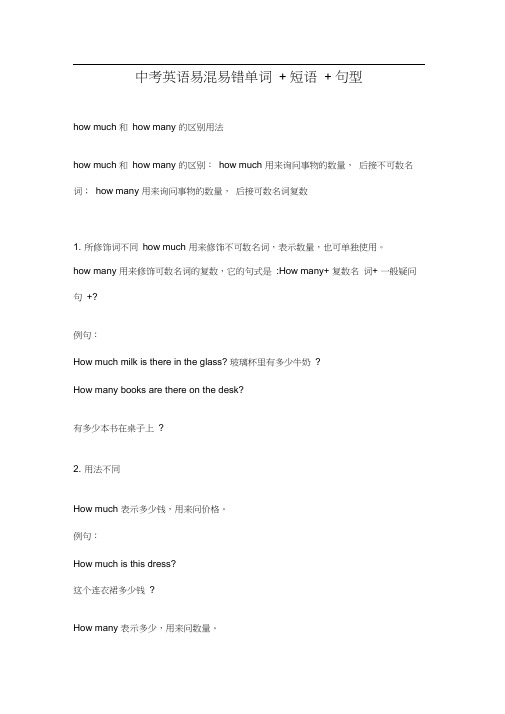
中考英语易混易错单词+ 短语+ 句型how much 和how many 的区别用法how much 和how many 的区别:how much 用来询问事物的数量,后接不可数名词;how many 用来询问事物的数量,后接可数名词复数1. 所修饰词不同how much 用来修饰不可数名词,表示数量,也可单独使用。
how many 用来修饰可数名词的复数,它的句式是:How many+ 复数名词+ 一般疑问句+?例句:How much milk is there in the glass? 玻璃杯里有多少牛奶?How many books are there on the desk?有多少本书在桌子上?2. 用法不同How much 表示多少钱,用来问价格。
例句:How much is this dress?这个连衣裙多少钱?How many 表示多少,用来问数量。
例句:How many apples do you have?你有多少苹果?in 和on 的区别用法当我们表示某些东西被其他东西所包围时使用“ in ”这个词。
而“ on 用于描述物体被放置在其他物体上方或外部的情况。
in 可表时间,表地点,表手段、方法、材料。
on 表示时间、地点、方位等。
1. 意思不同in :prep. 在... 里;在... 地方;在... 期间on :prep. 在... 之上2. 用法不同in :in 着重一段时间的过程,常用于重复动作或延续动作。
in 表示从现在时间算起推移到将来的一段时间之后,一般与将来时态连用。
例句:He is a layman in economics.他对经济学一窍不通on :表示“在物体的表面上”,只能用on 的表达方式有on the next morning ,on the following 。
例句:The spider is walking on the ceiling.蜘蛛在天花板上爬行。
2022-2023学年中考英语常见易混单词短语用法辨析(三)
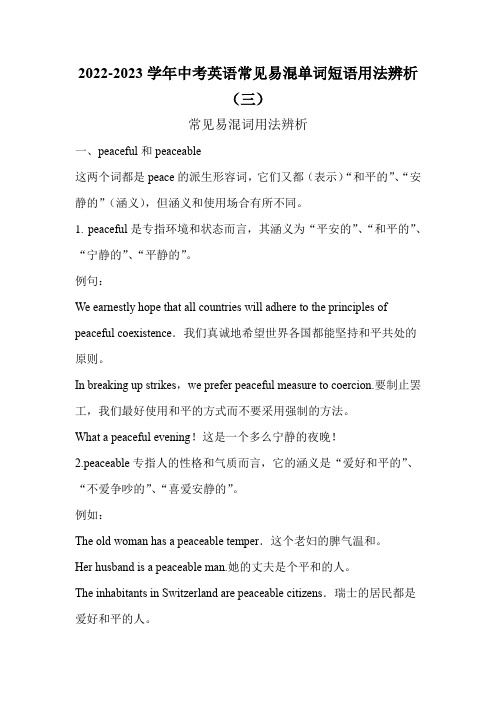
2022-2023学年中考英语常见易混单词短语用法辨析(三)常见易混词用法辨析一、peaceful和peaceable这两个词都是peace的派生形容词,它们又都(表示)“和平的”、“安静的”(涵义),但涵义和使用场合有所不同。
1.peaceful是专指环境和状态而言,其涵义为“平安的”、“和平的”、“宁静的”、“平静的”。
例句:We earnestly hope that all countries will adhere to the principles of peaceful coexistence.我们真诚地希望世界各国都能坚持和平共处的原则。
In breaking up strikes,we prefer peaceful measure to coercion.要制止罢工,我们最好使用和平的方式而不要采用强制的方法。
What a peaceful evening!这是一个多么宁静的夜晚!2.peaceable专指人的性格和气质而言,它的涵义是“爱好和平的”、“不爱争吵的”、“喜爱安静的”。
例如:The old woman has a peaceable temper.这个老妇的脾气温和。
Her husband is a peaceable man.她的丈夫是个平和的人。
The inhabitants in Switzerland are peaceable citizens.瑞士的居民都是爱好和平的人。
二、out of question和out of the question这一对片语仅差一字之微,涵义却大相径庭。
1.out of question的意思是“毫无疑问”,它是副词性短语,修饰谓语动词或整个句子。
其义相当于beyond question,beyond doubt。
例句:The general trend of the situation in Bosnia is out of question,developing in a direction more favourable to peace.毫无疑问,波斯尼亚形势的总趋势是朝着更加有利于和平的方向发展。
初中英语代词讲解

不定代词
不是指明代替特定名词(或形容词) 的代词 all, each, every, both, either, neither none, one, little, few, many, much other, another, some, any, no 由some, any, no, every 等构成的合成
中考考什么?
(2008年广东省汕头市)一Is that _____dog? —No .________is white.
A.his;His
B.her;Itis
D
C.he;His
D.her;Her
(重庆市2008年) We like Mr. Green because he often tells ______ funny stories in class. A. we C. our B. us D. ours
6.it可作为形式主语,将不定式、动
名词等构成的主语后移,使句子显得 平稳 It’s hard to reach the apples.
很难够到苹果。
It’s good for you taking a walk after supper.
对你来说饭后散步是有好处的。
物主代词
形容词性 my your his her its our your their 名词性 mine yours his hers its ours yours theirs
4.she可以用来代表国家、船只、大
地、月亮等
We love our motherland, we hope she’ll be stronger and bigger. 我们热爱我们的祖国,我们希望她更强大。 The ship is leaving. She’s on her first trip to Boston. 轮船要起航了。这是她第一次去波士顿。
中考英语代词知识点总复习

中考英语代词知识点总复习代词是用来替代名词的词,能够简化句子结构并避免重复使用名词。
中考英语中常见的代词包括人称代词、指示代词、反身代词、不定代词和相对代词等。
以下是这些代词的常见知识点总结:1. 人称代词(Personal Pronouns):- 主格: I, you, he, she, it, we, they- 宾格: me, you, him, her, it, us, them- 形容词性物主代词: my, your, his, her, its, our, their- 名词性物主代词: mine, yours, his, hers, its, ours, theirs - 反身代词: myself, yourself, himself, herself, itself, ourselves, yourselves, themselves2. 指示代词(Demonstrative Pronouns):- this, that, these, those3. 反身代词(Reflexive Pronouns):- myself, yourself, himself, herself, itself, ourselves, yourselves, themselves4. 不定代词(Indefinite Pronouns):- all, another, any, anybody, anyone, anything, both, each, either, everybody, everyone, everything, few, many, neither,nobody, none, no one, nothing, one, other, some, somebody, someone, something5. 相对代词(Relative Pronouns):- who, whom, whose, which, that需要注意的是,代词在句子中的作用和所代替的名词之间的关系要清楚、准确。
中考英语易混词汇辨析
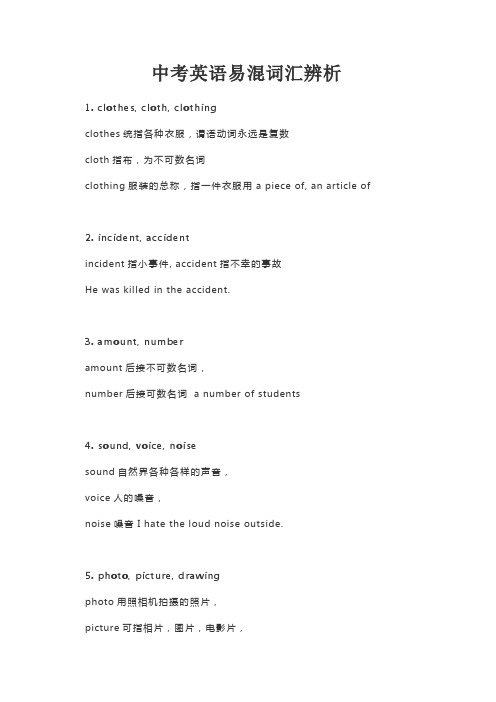
中考英语易混词汇辨析1. clothes, cloth, clothingclothes统指各种衣服,谓语动词永远是复数cloth指布,为不可数名词clothing服装的总称,指一件衣服用a piece of, an article of2. incident, accidentincident指小事件, accident指不幸的事故He was killed in the accident.3. amount, numberamount后接不可数名词,number后接可数名词 a number of students4. sound, voice, noisesound自然界各种各样的声音,voice人的嗓音,noise噪音I hate the loud noise outside.5. photo, picture, drawingphoto用照相机拍摄的照片,picture可指相片,图片,电影片,drawing画的画Let's go and see a good picture.6. weather, climateweather一天内具体的天气状况,climate长期的气候状况The climate here is not good for you.7. road, street, path, wayroad具体的公路,马路,street街道,path小路,小径,way道路,途径take this road; in the street, show me the way to the museum.8. course, subjectcourse课程(可包括多门科目),subject科目(具体的学科)a summer course9. custom, habitcustom传统风俗,习俗,也可指生活习惯,后接to do,habit生活习惯,习惯成自然,后接of doing.I've got the habit of drinking a lot.10. cause, reasoncause指造成某一事实或现象的直接原因,后接of sth./doing sth,reason用来解释某种现象或结果的理由,后接for sth./doing sth. the reason for being late11. exercise, exercises, practiceexercise运动,锻炼(不可数),exercises练习(可数),practice(反复做的)练习Practice makes perfect.12. class, lesson作"课"解时,两者可以替换.指课文用lesson.指班级或全体学生用class. lesson 6; class 513. speech, talk, lecturespeech指在公共场所所做的经过准备的较正式的演说,talk日常生活中的一般的谈话,讲话,lecture学术性的演讲,讲课 a series of lecture on…14. work, job二者均指工作。
人教版初三英语代词易混淆知识点
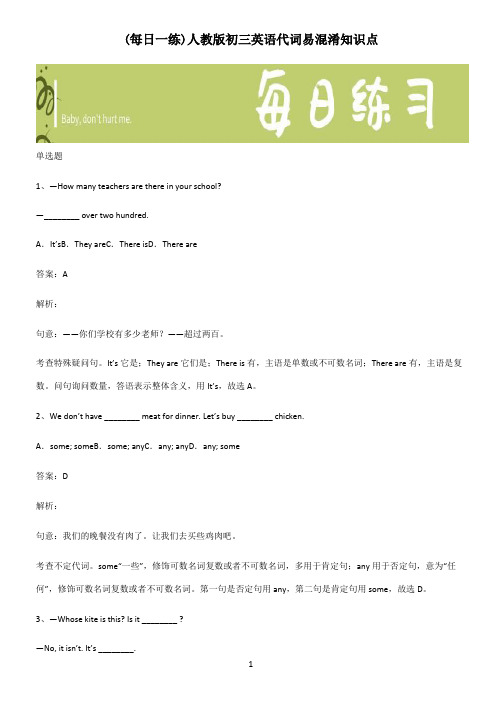
(每日一练)人教版初三英语代词易混淆知识点单选题1、—How many teachers are there in your school?—________ over two hundred.A.It’sB.They areC.There isD.There are答案:A解析:句意:——你们学校有多少老师?——超过两百。
考查特殊疑问句。
It’s它是;They are它们是;There is有,主语是单数或不可数名词;There are有,主语是复数。
问句询问数量,答语表示整体含义,用It’s,故选A。
2、We don’t have ________ meat for dinner. Let’s buy ________ chicken.A.some; someB.some; anyC.any; anyD.any; some答案:D解析:句意:我们的晚餐没有肉了。
让我们去买些鸡肉吧。
考查不定代词。
some“一些”,修饰可数名词复数或者不可数名词,多用于肯定句;any用于否定句,意为“任何”,修饰可数名词复数或者不可数名词。
第一句是否定句用any,第二句是肯定句用some,故选D。
3、—Whose kite is this? Is it ________ ?—No, it isn’t. It’s ________.A.you...hisB.you...himC.yours...himD.yours (i)答案:D解析:句意:——这是谁的风筝?这是你的吗?——不,不是。
这是他的。
考查代词用法。
根据“Whose kite is this?”可知,此处是询问是谁的风筝,第一个空需用名词性物主代词yours,表示“你的风筝”;回答也应用名词性物主代词,结合选项,用his,表示“他的风筝”,故选D。
4、I invite Tom and his twin sisters to go on a picnic with me, but ________ of them wants to go because they have too much work to do.A.noneB.eitherC.all答案:A解析:句意:我邀请Tom和他的双胞胎妹妹和我一起去野餐,但是他们都不想去因为他们有太多的工作要做。
【中考英语 易错题】易错点03 代词(解析版)
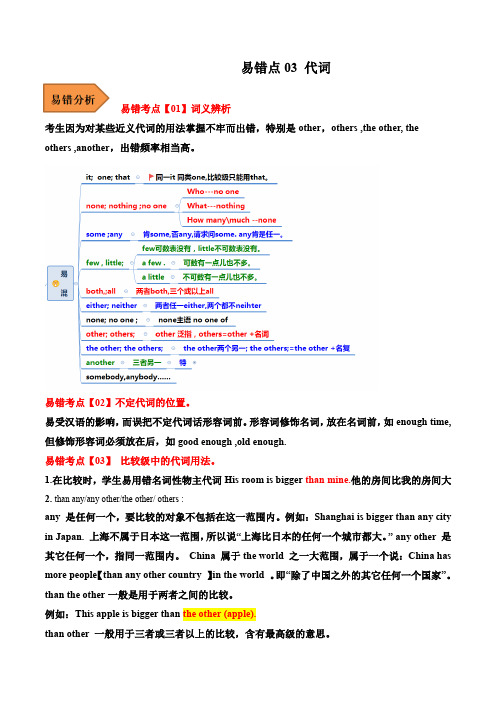
易错点03 代词易错考点【01】词义辨析考生因为对某些近义代词的用法掌握不牢而出错,特别是other,others ,the other, the others ,another,出错频率相当高。
易错考点【02】不定代词的位置。
易受汉语的影响,而误把不定代词话形容词前。
形容词修饰名词,放在名词前,如enough time,但修饰形容词必须放在后,如good enough ,old enough.易错考点【03】比较级中的代词用法。
1.在比较时,学生易用错名词性物主代词His room is bigger than mine.他的房间比我的房间大2. than any/any other/the other/ others :any 是任何一个,要比较的对象不包括在这一范围内。
例如:Shanghai is bigger than any city in Japan. 上海不属于日本这一范围,所以说“上海比日本的任何一个城市都大。
” any other 是其它任何一个,指同一范围内。
China 属于the world 之一大范围,属于一个说:China has more people【than any other country 】in the world 。
即“除了中国之外的其它任何一个国家”。
than the other一般是用于两者之间的比较。
例如:This apple is bigger than the other (apple).than other 一般用于三者或三者以上的比较,含有最高级的意思。
例如:this apple is bigger than other (apples). This means this apple is the biggest of all.3. ones与those 如:-The cars made in Germany are more expensive than those made in Japan.易错考点【04】形式主语与形式宾语。
李辉 辉哥中考英语小灶课-中考英语核心单词辨析

今天整理了中考英语复习的重点核心词汇,总结中考核心词汇考点,甄选高频、难记、易混词汇,并辅以最新中考真题,希望帮助考生们抓住要重点、提升效率。
李辉辉哥中考英语小灶课-中考英语核心单词辨析【中考英语核心单词辨析】1.borrow/lend/keep 辨析(1)borrow表示主语向别人借进东西,是短暂性动词。
谐音“抱走”。
词组:borrow sth.from sb.从某人借走某物(2)lend表示主语把东西借给别人,是短暂性动词。
谐音“烂的”。
词组:lend sb.sth.或lend sth.to sb.借给某人某物(3)keep“保持”。
表达“借多么”,通常与介词for连用。
--How long can I keep your phone?--You can keep it for 2 hours.2.feel感觉/摸起来给人...感觉(1)作系动词(把“主语”和“表现”联系起来!!!)·人+feel+adi表示“感觉..…”·物+feel+adj表示“摸起来.…”①I'm not feeling well today.我今天感到很不舒服。
②The shirt feels soft.这件衬衫摸起来很柔软。
(2)作实义动词(实义动词:实际发生的事情!!!)·feel like sth.想要某物(此处like是介词,后面必须加名词)·feel like doing sth.=would like to do sth.=want to do sth.想要做某事·feel free to do sth 随意做某事·feel+that从句感到.…/感觉..…eg:Please feel free to call me.请随意给我打电话。
eg:Please feel free to ask me questions in our Wechat group.请在咱们微信群中随意问我问题。
中考英语单词分类速记-易混词对照

中考英语单词分类速记—易混词对照1.aloud(大声地)--cloud(云)2.bad(坏的)--sad(难过的)3.bank(银行)--rank(军衔)4.bed(床)--red(红的)5.beg(请求)--leg(腿)6.better(更好的)--letter(信)7.dig(挖)--pig(猪)8.bike(自行车)--like(喜欢)9.bit(一点儿)--hit(击中)10.block(大块)--clock(钟)11.boot(靴子)--foot(脚)12.box(盒子)--fox(狐狸)13.built(建造[过去式])--quilt(被子)14.but(但是)--cut(割)15.cap(帽子)--map(地图)16.car(汽车)--jar(坛子)17.card(卡片)--hard(努力地)18.carry(运送)--marry(结婚)19.cast(投掷)--east(东)20.class(班级)--glass(玻璃)21.crop(庄稼)--drop(使滴下)22.deal(分配)--meal(一餐)23.deed(行为)--need(需要)24.door(门)--poor(可怜的)25.dump(垃圾堆)--jump(跳)26.fast(快的)--last(最后的)27.fever(发烧)--never(从不)28.fire(解雇)--hire(雇用)29.fish(鱼)--wish(希望)30.five(五)--live(生活)31.fix(安装)--mix(混和)32.fool(愚蠢的)--pool(小池)33.grade(年级)--trade(贸易)34.grain(谷物)--train(火车)35.hide(躲藏)--ride(骑)36.hot(热的)--not(不)37.house(房子)--mouse(老鼠)38.into(到……里面)--onto(到……上面)39.jeep(吉普车)--keep(保持)40.just(恰好)--must(必须)41.kick(踢)--pick(捡)42.kind(种类)--mind(介意)43.kiss(吻)--miss(错过)ter(后来)--water(水)45.lest(唯恐)--rest(休息)46.lid(盖子)--rid(去掉)47.life(生命)--wife(妻子)48.love(喜爱)--move(移动)49.mail(邮件)--rail(铁轨)50.meal(一餐)--real(真正的)51.mine(我的)--nine(九)52.moon(月亮)--soon(不久)53.most(最多的)--post(邮局)54.mouth(嘴)--south(南)55.much(许多)--such(这样的)56.next(下一个)--text(课文)57.north(北)--worth(值得……的)58.pork(猪肉)--work(工作)59.push(推)--rush(冲)60.reason(原因)--season(季节)61.ring(响)--wing(翅膀)62.sea(海洋)--tea(茶)63.sorry(难过的)--worry(使担忧)64.talk(谈话)--walk(散步)65.taste(品尝)--waste(浪费)66.bad(坏的)--bed(床)67.bat(球拍)--bit(一点儿)--but(但是)68.beg(请求)--big(大的)69.coal(煤)--cool(凉的)70.dead(死的)--deed(行为)71.dear(亲爱的)--deer(鹿)72.dig(挖)--dog(狗)--dug(dig的过去和过去分词)73.fall落下--fill装满--full满的74.fan(扇子)--fun(玩笑)75.farm(农场)--form(建立)76.fix(安装)--fox(狐狸)77.glass(玻璃)--grass(草地)78.hare野兔--here在这里--hire(雇用)ke(湖)--like(喜欢)ke(湖)--lame跛的--late(迟的)st(最后的)--lost(丢失的)82.live(生活)--love(喜爱)83.meat(肉)--meet(遇见)1 / 284.month(月份)--mouth(嘴)(网)--not(不)86.new(新的)--now(现在)87.nine(九)--none(没有人)88.police(警察)--polite(有礼貌的)89.quiet(安静的)--quite(很)90.red(红色的)--rid(去掉)91.ride(骑)--rise(升高)92.rise(升高)--rose(玫瑰花)93.same(同一的)--some(一些)94.set(安置)--sit(坐)95.ship(轮船)--shop(商店)96.shirt(衬衫)--skirt(裙子)97.shy害羞的--sky天空--spy(间谍)98.sing(唱)--song(歌曲)99.son(儿子)--sun(太阳)100.test(测验)--text(课文)101.thank(谢谢)--think(思考)102.track(足迹)--truck(卡车)103.wall(墙)--will(将要)104.wash(洗)--wish(希望)105.win获胜--won(win过去式/分词)106.and(和)--ant(蚂蚁)--any任何的)107.bed(床)--bee(蜜蜂)--beg请求)108.book(书)--boot(靴子)109.box(盒子)--boy(男孩)110.bread(面包)--break(打破)111.bus(公共汽车)--but(但是)112.can能够--cap帽子--car汽车--cat113.clean(干净的)--clear(清楚的)114.cook(烹调)--cool(凉的)115.cup(小茶杯)--cut(切)116.deed(行为)--deer(鹿)117.dig(挖)--dip(浸)118.find(发现)--fine(美好的)119.fit(适合)--fix(修理)120.food(食物)--foot(脚)121.guess(猜)--guest(客人)122.hand(手)--hang(挂)123.hard(努力地)--hare(野兔)124.head头--hear听--heat热)125.hen(母鸡)--her(她的)--hey([口语]嗨)126.him(he的宾格)--hit(击中)127.hold(抓住)--hole(洞)128.is(是)--it(它)129.job(工作)--joy(欢乐)130.kind(种类)--king(国王)me(跛的)--lamp(灯)132.leg(腿)--let(让)133.meal(餐)--mean(意思是)134.mind(介意)--mine(我的)135.nod点头--nor也不--not不136.park(公园)--part(部分)137.pass(传递)--past(经过)138.plan(计划)--play(玩)139.plane(飞机)--plant(植物)140.pool(水池)--poor(可怜的)141.rice(大米)--rich(富的)142.sale(卖)--salt(盐)143.sea(海洋)--see(看见)144.sit(坐)--six(六)145.talk(谈话)--tall(高的)146.up(向上)--us(we的宾格)147.warm(温暖的)--warn(告诫)148.word(词)--work(工作)友情提示:范文可能无法思考和涵盖全面,供参考!最好找专业人士起草或审核后使用,感谢您的下载!。
中考英语语法讲解之代词和数词
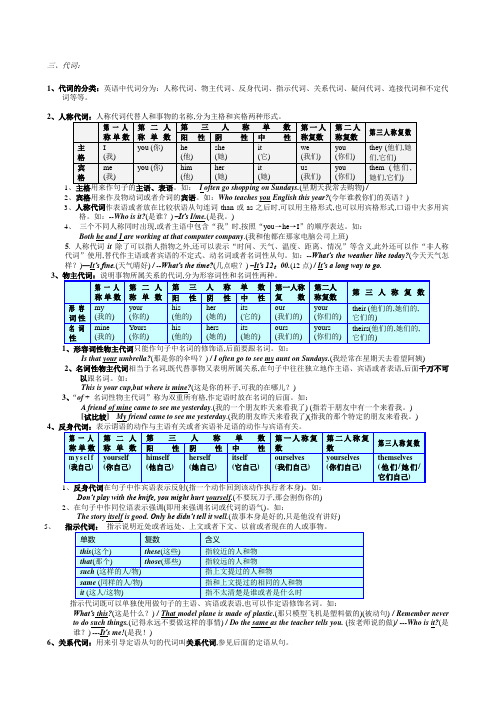
三、代词:1、代词的分类:英语中代词分为:人称代词、物主代词、反身代词、指示代词、关系代词、疑问代词、连接代词和不定代词等等。
21I often go shopping on Sundays.2、宾格用来作及物动词或者介词的宾语。
如:Who teaches you English this year?(今年谁教你们的英语?)3、人称代词作表语或者放在比较状语从句连词than或as之后时,可以用主格形式,也可以用宾格形式,口语中大多用宾格。
如:--Who is it?(是谁?)–It’s I/me.(是我。
)4、三个不同人称同时出现,或者主语中包含“我”时,按照“you→he→I”的顺序表达。
如:Both he and I are working at that computer company.(我和他都在那家电脑公司上班)5. 人称代词it除了可以指人指物之外,还可以表示“时间、天气、温度、距离、情况”等含义,此外还可以作“非人称代词”使用,替代作主语或者宾语的不定式、动名词或者名词性从句。
如:--What’s the weather like toda y?(今天天气怎样?)—It’s fine.(天气晴好) / --What’s the time?(几点啦?)–It’s 12:00.(12点) / It’s a long way to go.3Is that your umbrella?(那是你的伞吗?) / I often go to see my aunt on Sundays.(我经常在星期天去看望阿姨)2、名词性物主代词相当于名词,既代替事物又表明所属关系,在句子中往往独立地作主语、宾语或者表语,后面千万不可以跟名词。
如:This is your cup,but where is mine?(这是你的杯子,可我的在哪儿?)3、“of + 名词性物主代词”称为双重所有格,作定语时放在名词的后面。
- 1、下载文档前请自行甄别文档内容的完整性,平台不提供额外的编辑、内容补充、找答案等附加服务。
- 2、"仅部分预览"的文档,不可在线预览部分如存在完整性等问题,可反馈申请退款(可完整预览的文档不适用该条件!)。
- 3、如文档侵犯您的权益,请联系客服反馈,我们会尽快为您处理(人工客服工作时间:9:00-18:30)。
如何有效区分another ;other;
another;the other ;the others; others
我们从两个方向上区分:第一,从特指,泛指上;第二,从后面所跟的名词单复数上。
小试身手吧
请用another,the other,other,others 填空。
1.Some people like to rest in their free time. _______ like to travel.
2.This cake is delicious! Can I have _______ piece, please?
3.The supermarket is on ______ side of the street.
4.There were three books on my table. One is here. Where are ______?
5.There are 28 students in our class. Ten of them are girls and _______ students are boys.
答案:1. others (无特定范围,后面无名词复数)
2. another (无特定范围,数量上的增加)
3. the other (街道有两边,这里指另一边)
4. the others (特指三本书中的另外两本,后面无名词复数)
5. the other(特指班里除了女生之外的男生,后面有名词复数)
区分any-,every-,some-
1.问句“你有一些钱吗?”和“你能给我一些钱吗?中的“一些”,该如何翻译呢?
是some money? 还是any money?
2.any 和some 傻傻分不清楚了吗?
上面所讲的你听明白了吗?下面我们来小试身手吧。
1. --What a bad day! --Everyone has one of those days when ______ go right.
A. nothing
B. anything
C. everything
D. something
2. He thinks himself somebody, but we think him ______.
A. nobody
B. anybody
C. somebody
D. everybody
3. --Is ______ here? --No, Tom hasn’t arrived here yet.
A. somebody
B. anybody
C. everybody
D. nobody
4. He can’t do ______ very well. After all, he is new here.
A. something
B. nothing
C. anything
D. everything
答案:1. A 2. A 3. C 4. D。
